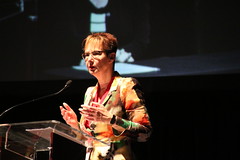
Speaker: Anja Smit, Utrecht University
Ancient scholars would not recognize our modern libraries. There are new services (via the internet) that replace some of the services of library, and we need to continual re-evaluate what value we are adding.
For example, we are putting a lot of effort into locally managed discovery services, and yet a majority of sources referring users to content are Google and Google Scholar. For some disciplines, the library plays a very small role in discovery of content, so the Dutch have focused on providing access to content over discovery.
But, what if OA becomes the publication model of the future? What if Google does digitize all the books? What if users organize access themselves?
The Dutch consortia is flipping some pricing models. In two of the licenses they currently hold, they are paying for the cost of publication rather than the rights for access, and they are making the Dutch scholarly work OA globally. However, they have found perpetual access, or preservation, has not been an easy thing to negotiate or prioritize.
Librarians have been trying to find a solution for long-term preservation since the dawn of digital publication. There are some promising initiatives.
France has built a repository that includes access (not just a dark archive). How do we scale this kind of thing globally? Funding is local. We will never have a global system, so we need local systems based on a standard that will connect them.
Libraries do not own the digital content. We can collect it, but we tend to collect what our community needs rather than the output of our researchers.
Libraries can put things on the agenda of other stakeholders. OA and Open Science is on the agenda of politicians and governments because of libraries.
To-do:
- Make perpetual access to knowledge the top priority on our agenda.
- Get perpetual access to knowledge on the agenda of relevant stakeholders as quickly as possible. Collectively.
- Find partners to develop longer term preservation infrastructure.
We can leave the rest to Google.
Q&A
Q: Dutch presidency of EU and Dutch proposals for OA – what do you think of the Dutch policies in this area?
A: We are all trying to find solutions to further and advance access to knowledge. That is our common goal. This is such a complicated issue — all the stakeholders have to work together to do this.
Q: Libraries have not done as well a job of preserving media. Not as concerned about the availability of scholarly journals and books in the future — what happens to the emails and other media forms that are getting lost?
A: Documented knowledge is at the core of libraries. The other areas have much bigger problems. That is such a huge area that she would not presume to have ideas or suggestions for solutions.
Q: Libraries are being pressured to collect and manage raw faculty research, without additional support, so it’s taking away from collecting in traditional areas.
A: Some say that this will become the new knowledge — data will trump publication. Libraries are best positioned to help researchers manage their data in a consultancy role, and let IT handle the storage of the data. We could spend a little less on collection development to do this.
Q: What will happen when Google is no longer freely accessible and there’s a cost?
A: It doesn’t help if we keep pointing people to local collections. Our users use Google, so we need to help them find what they are not able to find there themselves.
